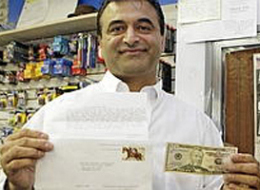Spirituality
The Art of Compassion, From a Storeowner to a Would-be Robber
Storeowner's compassion changes life of would-be robber.
Posted December 21, 2009
The Dalai Lama said, "If you want others to be happy, practice compassion. If you want to be happy, practice compassion." We know that forgiveness and compassion are important for a meaningful, happy life. Yet, it is much easier to understand the importance of forgiveness than to be motivated enough in the heat of the moment to actually practice it. Every once in a while, you hear a story that makes you want to change and gives you the inspiration to practice forgiveness. Recently, I heard such a story:

Six months ago, a man wielding a baseball bat entered the convenience store of Mohammad Sohail of Shirley, New York. "Give me the money" the robber yelled. Mohammad quickly reached for his rifle and pointed it at the robber's face, forcing the man to drop the bat. (Little did the robber know that Mohammad never loads his gun.)
The robber dropped to his knees and began to cry, pleading with Mohammad saying, "I'm sorry, I have no food. I have no money. My whole family is hungry. Don't call the police. Don't shoot me." When Mohammad saw the man crying, he knew that this was not just a typical robbery.
Mohammad told the man that he would not call the police but to promise never to rob anyone ever again. The man agreed. Mohammad then handed the man $40 and a loaf of bread. Mohammad went to the back of the store to get him some milk, but when he returned the man had fled the store with the $40 and bread.
Mohammad hoped that the man would keep his promise.
About one month ago, Mohammad received an envelope with no return address. Inside he found a $50 bill and a note that read, "At the time I had No money No food on my table No Job, and nothing for my family. I know that it was wrong, but I had know (sic) choice. I needed to feed My family. When You had That gun to my head I was 100% that I was going to die."
The letter from the would-be robber continued by stating, "Now I have a new child and good job make good money staying out of trouble and taking care of my family. You gave me forty dollars thank you for sparing my life Because of that you change my life."

"I am very happy that somebody got to change his life," Mohammad said. "When you do good things for somebody, it comes back to you. I gave him $40 and he sent me back $50. It was a good investment."
Compassion and forgiveness are investments, which can feel risky at times. But, they are investments that pay off - not just for the recipient of the compassion but for the donor as well.
Michael McCullough, professor of psychology at the University of Miami, and author of Beyond Revenge: The Evolution of the Forgiveness Instinct, says that in order to understand our human potential for compassion there are three essential truths about revenge and forgiveness we must know:
Truth #1: The Desire for Revenge is a Built-In Feature of Human Nature
We should not be ashamed for wanting revenge at times. The desire for revenge is a human instinct.
McCullough describes the work of evolutionary biologists Martin Daly and Margo Wilson who looked at the desire for revenge in 60 diverse societies all across the globe. They found that 57 of the 60 societies had some reference to blood feuds or capital punishment.
Revenge is a part of our human nature and evolutionarily has helped prevent future aggressors from inflicting harm upon victims.

Truth #2: The Capacity for Forgiveness is a Built-In Feature of Human Nature
While revenge is a human instinct, so is forgiveness. Forgiveness is as equally ubiquitous as is revenge. McCullough describes how in his own research he has found that in the same 60 societies that Daly and Wilson studied, 93% percent of those societies include concepts of forgiveness and reconciliation.
If we have the instinct to desire revenge but also have the capacity to forgive, what motivates us to choose one over the other?
McCullough says that under the right social conditions, we will choose forgiveness over revenge, which leads us to inquire, "what are the right social conditions?"
Truth #3: To Make the World a More Forgiving, Less Vengeful Place, Don't Try to Change Human Nature-Change the World!
McCullough explains that while revenge and forgiveness are human instincts. They are sensitive to context.
When a society is replete with crime and police enforcement is weak, people tend to use revenge in order to punish aggressors and discourage cheaters. Yet, more forgiveness is shown in societies where there are efficient police and judicial systems and where people depend on cooperative relationships.
Our culture can also shape the rates of forgiveness and revenge. McCullough states that often we learn when revenge and forgiveness is appropriate from our culture.
It is important to remember that we cannot change billions of years of evolution and that revenge and forgiveness are adaptive solutions to a problem.
Although we might feel the desire for revenge as our heartbeat quickens and our blood begins to boil, we must remember that we also have the instinct to forgive. We can choose which type of solution we want to employ. Like Mohammad Sohail, we can choose to use forgiveness and compassion, and experience their rewards.
For more articles and information, please visit: AdoreeDurayappah.com
Reference:
Beyond Revenge: The Evolution of the Forgiveness Instinct. Copyright © 2008 by Michael E. McCullough




